|
China Law
Administration and Associations |
|
|
|
|
Chinese Law: Sources
/ Information with
 Rating
Rating
|
|
|
|
|
Blogs: China Law and Justice System
with
 Rating
Rating
|
|
China Law Blog Sites
China Law
Bloggers
|
|
|
China
Law Education and Research
|
|
|
|
|
International Sources:
China Law and Justice |
-
Chinese officials urged not to execute
domestic violence victim
-- Call comes after supreme people's
court reportedly upholds death sentence
for Li Yan who killed her abusive
husband (link
to full story)
-
Police in China break up honeypot
ring - Police in China claim they
have broken up a criminal ring of
extoritionists who hired women to lure
politicians into honeypot traps before
filming them in bed together and
threatening to post the footage online.
(link
to full story)
-
China to phase out prisoner organ
donations, says expert (click
for full report)
-
China unveils new legislation on police
powers of detention (link
to full story)
-
Patent dragon awakes - China shifts
approach to innovating from copying (link
to full story)
-
Who owns what? The
perils of investing where
the law is unclear (details)
-
China arrests 1000s in gang crackdown (link
to full story on News24)
-
China: who will defend the law's
defenders? Human rights lawyers in
China are increasingly being subjected
to arbitrary detention and torture. They
need protecting (click
for details on Guardian UK)
-
Amnesty International Accuses China of
Silencing Human Rights Lawyers (click
for details)
-
Student executed for 'peasant' murder
that outraged China (click
for details)
-
China orders suspension of death
sentences - China has apparently
introduced new standards to reduce the
number of criminals it executes (click
for details)
-
China rights lawyer Li missing, wife
pleas for information (click
for details)
-
China to adopt new law to end violence
in forced demolitions (click
for details)
-
China executed more people than rest
of world combined: Amnesty (click
for details)
-
U.S. lawsuits against China companies
face hurdles (click
for details)
-
China launches whistleblower
websites: The Chinese can now tip off
the authorities on corrupt court
officials through the internet.
(click
for details)
-
Over 600 held in China for selling train
tickets illegally (click
for details on Sify.com)
-
China busts 6,000 cases involving
trademark breach (click
for details)
-
In China, no more ‘prostitutes’, only
‘fallen women’ (click
for details)
-
Chinese father punished for food safety
activism (click
for details)
-
China's booming bogus business -
Product fakery employs millions of
people, but the government is starting
to crack down (click
for details on Vancouver Sun)
-
THE drunk son of a Chinese policeman who
hid behind his father for 12 days after
allegedly killing a pedestrian while
driving his car has been arrested. (click
for details on the Australian)
-
Life After China's Antimonopoly Law
- Foreign companies are discovering they
might not be the law's prime targets
after all.. (click
for details on the Wall Street Journal)
-
China police investigate 'black jails'
for protesters (click
for details on BBC news)
-
CHINA has vowed to punish people guilty
of food safety crimes, calling for the
death penalty to be applied in cases
when the culprits "deserve" it, state
media reported today. (click
for details)
-
Chinese woman sues cinema hall for
excessive ads (click
for details on Sify)
-
China's blind activist lawyer released
from prison (click
for details on Washington Post)
-
China responds to growing
'protectionism' complaints - China has
promised to treat foreign firms hoping
to win government contracts equally with
domestic competitors, following months
of complaints from multinationals that
China isn’t offering them a
level-playing field. (click
for details)
-
China jails writer for 15 years for
'endangering state security'Human rights
organisations attack heavy sentence on
Uighur journalist who had warned about
ethnic violence in Xinjiang (click
for details on the Guardian, UK)
-
China Sentences U.S. Geologist to 8
Years Over State Secrets (click
for details)
-
Copyright Neglected - Western companies
aren't the only ones victimized by
intellectual property theft. Here's how
Chinese firms have learned to protect
their bottom lines. (click
for details)
-
Software piracy declining in China (click
for details)
-
School
killings cast spotlight on social
stresses in China (click
for details)
-
China: Confession Obtained by Torture
(click for details)
-
China admits man wrongfully imprisoned
for 10 years after being tortured to
confess (click
for details)
-
China disbars two rights defense lawyers
(click
for details)
-
China urges tough Internet laws (click
for details)
-
China Amends Law to Force Internet
Companies to Help in Probes (click
for details)
-
China tightens curbs on lawyers (click
for details)
-
South African woman is sentenced to
death in China (click
for details)
-
‘Conscience of China’ comes home -
Commonly called the “Conscience of
China,” lawyer Gao Zhisheng was carted
off by security police into the darkness
of a winter’s night last year, dropped
into the maze of China’s official and
unofficial jails — and “disappeared.” (click
for details)
-
China charges online 'swingers'
in Nanjing (click
for details)
-
Man sentenced to death over
China school stabbings - A
former community doctor has been
sentenced to death for stabbing
and killing eight school
children in southern China last
month.
(click for
details)
-
Japan
concerned by China execution
-
Dissident
Chinese lawyer 'gives up'
- Mr Gao said he had been
through cruel experiences -
Chinese human rights lawyer Gao
Zhisheng has reappeared in
Beijing, saying he is giving up
his campaigning so he can
reunite with his family
-
China to
execute Japanese
-
Rio China
trial defendant says treated
fairly-lawyer
-
China Says
Lawyer ‘Sentenced’
-
China
Announces Sentence for Missing
Dissident
-
In China's
'rubber-stamp' legislature,
country comes first
-
China
defends UK company Strix's
intellectual property rights
-
China
police ordered to resign over
detainee 'torture'
-
Lawyer's
Trial Renews Rule-Of-Law
Concerns In China - by Anthony
Kuhn
-
Unhappy
new year for 'disappeared'
Chinese rights (the Age,
Australia)
-
China's
Legal Catch-22 - A pair of
upcoming trials spotlights the
inherent struggles in the
nation's law system - Paul
Maidment (link to
Forbes)
-
Missing
Chinese lawyer Gao Zhisheng is
'out west' - A Chinese lawyer
missing for more than a year is
alive and living in the far west
of the country, a US-based human
rights group had said (link to
BBC News)
-
China
Charges Electronics Magnate -
Once China's second-richest man,
Huang Guangyu now faces
indictment for corruption (link
to Forbes)
-
Lawyer in
China mob trial gets 1 1/2 years
on appeal (link to Washington
Post)
-
British victory in China as patents
dispute boils over - THE British company
whose founder invented the kettles that
switch off automatically when they boil
has had China patents win. (link to the
Australian)
-
China
tightens graft rules for court
officials (link to Reuters
India)
-
China to
Move Against Local Lobbyists
(link to The New York Times)
-
China
jails former top judge for
corruptionLife in jail for
supreme court's former
vice-president Huang Songyou
over $500,000 fraud and bribery
offences
(link to Guardian, UK)
-
Leading
Human Rights Attorney Is Missing
(link to JD Journal)
-
Brother:
Police Say China Lawyer 'Went
Missing' (Link to New York
Times)
-
Jailing Of
China Gang Lawyer Alarms Legal
World (link to the New York
Times)
-
China
Turns Drug Rehab Into a
Punishing Ordeal (The New York
Times)
-
China
executes 7 gang leaders for
murder, gambling, gun sales,
report says
-
China
Jails Tibetan Film-Maker for Six
Years (ABC News)
-
China to
put Supreme Court judge on trial
- China is to put one of its
most senior judges on trial for
allegedly accepting a bribe of
four million yuan (£365,000).
-
Harsh
words for China in Wednesday's
papers - There are harsh words
for China over its decision to
execute a British man convicted
of drug smuggling.
-
China has
warned Britain that it must stop
its fierce condemnation of the
execution of Akmal Shaikh for
drug smuggling, or risk harming
diplomatic ties between the two
countries (Telegraph, UK)
-
British
man said to be mentally ill
executed in China (BBC) - A
British man convicted of drug
smuggling in China has been
executed, the Foreign Office has
confirmed.
-
France berates China over
sentencing of dissident
(Reuters)
-
China set to execute British man
(CBC.ca)
-
Diplomats
try to attend China dissident's
trial - By By CARA ANNA
(MSNBC)
-
China gang
trial takes twist as lawyer
arrested (Reuters
India)
-
China Calls on Canada to Honor
Commitment, Deport Lai Changxing
(Bloomberg)
-
Chinese
province favors lethal injection
over gunshot (CNN)
-
China's
public enemy No. 1 built a
cartel, beat the system and
moved to Canada The People's
Republic says he led a smuggling
ring. Now they want him back
(Toronto Star)
-
China
executes two men convicted of
child trafficking
(BBC News)
-
China
executes two for tainted milk
scandal (Reuters)
-
Shining a
light on China’s secret “Black
Jails” (Reuters)
-
Nine
people executed for summer’s
ethnic riots in western China
(Times online)
-
Chongqing’s Mafias Expose Grave
Woes in China’s Legal Apparatus
(The Jamestown Foundation)
-
Swiss seek
increased justice ties with
China - Switzerland is seeking
to increase cooperation with
China on criminal law and the
penal system following a visit
to Beijing by Justice Minister
Eveline Widmer-Schlumpf.
(SwissInfo.ch)
-
Landmark
U.S. Rule of Law Program in
China Marks Decade
(Reuters)
-
A
Copyright Complaint From China -
Chinese writers are planning
group action aginst Google for
digitizing their books without
paying them.(Forbes)
-
Westlaw
Business Launches in China and
Hong Kong
(Reuters)
-
China's
Xinjiang trials fail global
standards (AsiaOne)
-
China
begins major corruption trials
(The Australian)
China finally acts on
B.C. homicide (The Globe and Mail)
Mentally ill Briton
faces 'execution in days' in China (Guardian, UK)
China Legal Activist
Released on Bail
Police held in China
gang probe
Drunk driver who
killed four sentenced to death in China
The perilous lives of
lawyers in China - As elsewhere they trade in justice. Guess who takes
offense
China Shuts Down
Office of Volunteer Lawyers
Testing the waters of a changed China - Stronger
protections bring area law firms work, but can country really be trusted
with secrets?
Suit Over
China's Web Filter to Target
Lenovo, Acer, Sony
China
suspends lawyers? licenses -
Representatives of dissidents
are targeted
China
corruption website crashes - A
Chinese website set up so people
can inform on corrupt officials
has been inundated with so many
visitors that it crashed shortly
after launching.
China's
State Secrets Law to Focus on
Internet Leaks
China debates sex
change rules
China to swap bullets
for lethal injections
Accused killer freed
in China
China Tells Courts:
Curb Protests
Death penalty used
most in Chins - some 2390 people were executed last year,
including more than 1700 in China alone
China Said to Harass
Rights Lawyers (New York
Times)
China Said to
Threaten Licenses of Human Rights Lawyers (New York Times)
China lawyers: Touchy cases could mean disbarment(Washington Post)
A legal crusader
against polluters in China finds NW allies
China
Human Rights Lawyers Beaten
Above
the Law? China's Bully Law Enforcement Officers
China seeks
repatriation of bankers
China toughens
cybercrime rules
Beijing
Lawyers Beaten for Defending Falun Gong
China tops 2009 IPR offender list
China's New Power
Couple
China relaxes business regulations
China Arrests Web
Site Attacker Who Extorted Money
US Lawmakers Urge
China to Account for Rights Lawyer (Voice of America)
China firm takes
Baidu to court on monopoly claim (Reuters)
Foreign Businesses
Worry as China Considers New Postal Law (Wall Street Journal)
China 'to act over jail deaths' (BBC News)
China executes Uighur
'militants' BBC
Anti-Monopoly Law Inspires Consumer Suit
Against China Mobile
What Coca-Cola Did Wrong, And Right, In
China
China hi-tech exam
cheats jailed
China Should Release
Missing Human Rights Lawyer, Group Says
China Tops World Execution List at 72%, Amnesty Says
China 'hide and seek' prisoner was beaten
to death - KyivPost
China's Answer to a Crime Includes Amateur
Sleuths - The New York Times
The state of China's human rights lawyers -
Radio Netherlands
China rebuffs West on ending death penalty,
rights - Reuters
China unhappy Canada gave fugitive work
permit - MSNBC
China's most famous fugitive on
the job hunt - Toronto Star
Jailed
China milk-scandal chief appeals
sentence - Reuters
In China,
You Play By Another Set Of Rules
- When you are doing business in
China, the rules, timing, manner
and substance of your
transaction are unique- By
Ashley Wald
LETTER FROM ASIA: Is China's White-Collar
Death Penalty Fair? The AM Law Daily
China jails 11 for software piracy
Trials Continue in Tainted Chinese Milk
Scandal - The New York Times
China's Law Problems
Are Problems for Investors, Too - WSJ
China's Capital Cases
Still Secret, Arbitrary - By Maureen Fan and Ariana Eunjung Cha
(Washington Post)
Grieving parents file lawsuit in China - IHT
China sentences 2 to death for attack in
Xinjiang. IHT
China to cut business tax.
The Straits
Times
In China, it's pay up ... or else - By Don
lee
China police killer
loses appeal. BBC News
Lawsuits in China's milk scandal unlikely
to be settled in court.
IHT
China lawyers say govt warning against
tainted milk lawsuits.
AFP
Rare protest in China in support of police killer
China lawyers allege political pressure after aiding parents of sick
infants in milk scandal. Jurist
What China's tainted
milk may not bring: lawsuits. The Christian Science Monitor
China Creates Antitrust Commission.
WSJ
China lawyers call
for more open bar association. AP
China to review Coca Cola bid for juice
maker. AP
Coke Deal to Test China's Antitrust Law -
By Rick Carew and Sky Canaves WSJ
China Life investor lawsuit dismissed.
Market Watch
Death sentence in rampage sparks debate in
China - by Don Lee
China sentences 2 elderly women to labor
for seeking to protest. IHT USA
China Remains Top Executioner
China executes four. IOL, South Africa
China jails Liu Lun, its first office sex
pest. Times Online
On anti-drugs day, China executes 9
traffickers. The Times of India
China pronounces death sentences to drug
dealers. Business Standard
China cuts jail terms for political
prisoners -group. Guardian.co.uk
China's Nanning Sugar says local court
accepts suit against UK's Martin Currie. Forbes
China mulls death penalty reform. Asia Times Online
China should pardon
prisoners in Olympic year -group. May 8
Guardian.co.uk
China slams jail door
on Olympic dissent. The Star
3
get life terms for coal mine explosion in northern
China that killed 105. IHT. 08-02-25
Freed journalist
calls for China Olympics amnesty. Guardian UK 08-02-21
Death upheld for China ant aphrodisiac conman.
Reuters
China couple sue metro over kiss. BBC
China arrests over 1,480 people in
nationwide crackdown on substandard products
China to start prison administration reform nationwide
China’s labour laws. Financial Times
Business doubts impact of new laws in chaotic China:
analysts. AFP
China woman in legal first over abortion case.
Telegraph
China switches to lethal injection. Guardian, UK
China Formula One boss jailed for embezzlement.
Reuters
China's New Labor Law Goes Into Effect. VOA
Jan.1
Chinese court
sentences six terrorists to death, life imprisonment Xinhua 2007.11.12
China amends law to
make life easier for lawyers Oct. 28, 2007
Legislator: China to
unveil 20 regulations governing foreign M&A -- China will introduce more
than 20 supporting regulations on foreign mergers and
acquisitions (M&A) of domestic firms before August, a
senior Chinese legislator said on Saturday.
The regulations will come out in a series before the
Antitrust Law goes into effect on Aug. 1, 2008, Cheng
Siwei, vice chairman of the Standing Committee of the
National People's Congress, told a forum in Beijing.
The regulations will help ensure that foreign M&A deals
promote China's economic growth without threatening its
economic security, Cheng stated.
Under the Antitrust Law, China would scrutinize foreign
M&A proposals if they posed a potential threat to national
security, he noted.
To evaluate foreign M&A deals, the first factor should
be whether the domestic firms were fairly priced. The
second was whether the deal would lead to company asset
growth, Cheng added. (Xinhua 2007-11-24)
New law to promote
energy conservation Oct. 24, 2007
China's police chief
promises security support for Party congress
Oct. 9, 2007-
China's Ministry of Public Security has promised police from around China
will support Beijing police in their security operations for upcoming 17th
National Congress of the Communist Part of China (CPC), which is due to
convene next week.
Chinese firm wins
patent lawsuit against Schneider
Sept. 29, 2007 - A
Chinese low-voltage product company won a patent infringement lawsuit
against France's Schneider Electric and its Chinese sales agent on Saturday,
which involves 330 million yuan in compensation. A court in east China's
Zhejiang Province ordered that the Tianjin-based joint venture, in which
Schneider holds 75 percent of stakes, and its authorized distributor
Leqing Branch of Star Electric Equipment Co. Ltd. in Zhejiang, stop
selling five models of products that are based on the technology owned by
Chint Group,China's leading manufacturer of low-voltage electric
apparatus. In addition, the world's leading electric equipment maker
should pay 334.8 million yuan (4.3 million U.S. dollars) in ten days to
compensate Chint's economic losses due to the unauthorized production and
sales of the apparatus, according to the verdict handed down by Wenzhou
Intermediate People's court on Saturday. (Click the title for full story.)
China's landmark
property law takes effect
Oct. 1, 2007 - China's landmark Property Law that provides equal
protection to both state and private properties was put into effect on
Monday. The law approved by the national legislature in March after
repeated revisions and unprecedented eight readings is seen as a
significant step in the country's efforts to further economic reforms and
boost social harmony. The 247-article law stipulates that no units or
individuals may infringe upon the property of the state, the collective
and the individual. "The law will inspire people's enthusiasm to create
wealth and is helpful for them to fully enjoy the fruit of reform and
opening-up," said Xu Xianming, president of the China University of
Political Science and Law.(Click
the title for full story.)
"Stay-behind
children" need education and guidance
September 23 – The number
of juvenile dilingquents have leapt by 13% every year since 2000, many of
them being stay-behind children, the children of migrant workers. "More
and more juvenile delinquents in China are involved in violent acts or
mafia activities, besides, quite a large number of them have used
intelligent methods when committing offences, " said Shao Wenhong, the
director of the research laboratory of the Supreme People’s
Court.Currently there are 150 million migrant workers nationwide, who
leave 29.9 million children back home. Without proper guardianship and
family education, it is easy for stay-behind children to be misguided by
bad information from the society. (Chinanews, Nanchang)
Anti-monopoly Law Adopted
Aug. 30, 2007 - The Standing Committee of the National People's
Congress (NPC), China's top legislature, on Thursday adopted the
anti-monopoly law to ensure fair competition and regulate market
order. The law, which began to be drafted 13 years ago, will come into
effect on Aug. 1, 2008. The law requires foreign purchases of Chinese
companies to go through national security checks.
China's first anti-monopoly law to be voted Aug.24, 2007
BEIJING, Aug. 24 (Xinhua) -- China's first
anti-monopoly law, which requires foreign purchases of Chinese
companies to go through national security checks, is expected to be
put to a vote later this month after being 13 years of deliberation.
China: McDonald's Sued
Over Receipt
July 27, 2007 -
A lawyer has sued McDonald's in China because
receipts it gave out were mostly in English, a state-run newspaper
reported Friday. The Beijing Youth Daily said the lawyer, identified
as Shan, argued that the use of English instead of Chinese was a
violation of his rights.
"McDonald's offers
food service in China, but it does not use Chinese, which ...
violates the consumers' right to know," the newspaper quoted Shan as
saying.
It said Shan decided to take action after eating
at two of the company's restaurants in Beijing earlier this year.
Spokespeople for McDonald's were not available
after repeated calls to their offices in Beijing on Friday.
The Youth Daily said Shan wants an apology and
compensation of 1 yuan, about 13 U.S. cents. It did not give details
on any court case.
The newspaper quoted a McDonald's official as
saying the receipts were changed earlier this month, and that all
its menus and advertisements were in Chinese.
Ex-chief of China's drug watchdog
executed
July 10, 2007
- Zheng Xiaoyu, former director of China's State Food and Drug
Administration (SFDA), was executed on Tuesday morning with the
approval of the Supreme People's Court. Zheng, 63, was sentenced to
death on May 29 by the Beijing Municipal No. 1 Intermediate People's
Court after being found guilty of taking 6.49 million yuan (about
850,000 U.S. dollars) in bribes and dereliction of duty. (Click
title of this news for full report.)
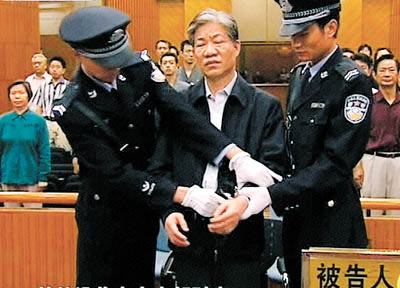
- China's courts recruit more
staff for death penalty reviews
BEIJING, June
22 (Xinhua) -- China's courts will hire 1,900 more staff for open
court trials for second instance death sentence cases, according to a
source with the Supreme People's Court (SPC).
"Over the past
year, the SPC has been recruiting personnel for local courts where
case numbers are high," the unnamed SPC official told an inspection
team of the National People's Congress, the parliament, in a working
report.
According to
China's Criminal Procedural Law, since July 2006, open court sessions
are obligatory when a second instance case is defended by a people's
procuratorate. Previously, most appeal cases -- even death
penalty cases -- were not been heard in open court because of a lack
of qualified personnel. A local court source confirmed that
understaffing often made it impossible to try death penalty cases in
open court sessions.
Since 2005, Chinese media
have exposed several errors of judgement in death sentence cases and
have criticized courts for alack of caution. If second instance
trials are not heard openly, the public do not feel convinced -- the
process is not transparent, the rights and interests of the accused
are not fully protected, and judicial errors could occur," said the
source, adding that the second line of defence is vital in correcting
mistakes in original verdicts and preventing injustices.
Last year, about 25,000 new
staff were added to Chinese courts to beef up local courts.
Statistics show that last year
889,042 people were convicted by courts at all levels across the
country, and 153,724 people received sentences longer than five years,
including life imprisonment and death penalty. Figures
from the Beijing No. 1 and No. 2 intermediate people's courts indicate
that in the first five months of 2007 the number of death sentences
dropped 10 percent from last year.
China ex-drug chief
appeals death sentence
June 12, 2007 - China's former food and drug safety chief, facing
execution for corruption amid a series of health scandals, has
appealed against the death penalty, media said on Tuesday. Zheng Xiaoyu, former head of the State Food and Drug
Administration, was convicted in May on charges of taking bribes and
dereliction of duty. It was an harsh sentence, reflecting the weight
China is giving to the issues of corruption and food safety as they
grapple with a series of safety breaches involving toxins in food
and other products.
-
Former head of China's
drug watchdog sentenced to death
People's Daily, May 29, 2007 - Zheng Xiaoyu, former director of
China's State Food and Drug Administration (SFDA), was sentenced to
death by a Beijing court Tuesday morning. Zheng, 63, was convicted
of taking bribes and dereliction of duty, according to the first
instance hearing of the Beijing Municipal No. 1 Intermediate
People's Court. (Click
for full report.)
-
Yahoo sued over kowtowing to China, Vnunet.com April
20, 2007
-
Canadian gets life term in China Toronto Star, April
20, 2007
-
Chinese writer sues US movie giant over copyright
Xinhua News, April 11, 2007
-
A local court on Wednesday heard the lawsuit by a
Chinese science fiction writer for alleged infringement of his
copyright by US movie giant 20th Century Fox Film Corporation. The
court open at 8:30 a.m. on the second day after the US government
filed two WTO cases against China over intellectual property rights
and access to the Chinese publication market. The writer, a
43-year-old Li Jianmin, said 20th Century Fox while producing the
movie The Day After Tomorrow copied the creative conception and the
major plots of two plays he completed in 2001 and 2002. Li lodged the
lawsuit at the the Intermediate People's Court of Dongying, east
China's Shandong Province in March last year. The court accepted the
suit last April.
-
China Approves Property Law, Strengthening Its
Middle Class, New York Times, Mar. 16, 2007
-
China toughens crackdown on
corrpution
Xinhua, Jan. 9, 2007 - Chinese President Hu Jintao on Tuesday pledged
a more severe and systematic crackdown on corruption in a key-note
speech delivered at a national anti-graft conference. Hu, who is also
the General Secretary of the Central Committee of the Communist Party
of China (CPC), made the call at the Seventh Plenary Session of the
CPC Central Commission for Discipline Inspection (CCDI), a three-day
meeting that started on Monday. Acknowledging the progress the
commission had made in the past year, Hu said the Party still faced an
"arduous fight against corruption". (Click
for full report)
-
Chinese prosecutors probe
9,582 commercial bribery cases in 2006
Xinhua, Feb. 21, 2007 - Chinese prosecutors probed 9,582 commercial
bribery cases involving public servants in 2006 Xinhua has learnt from
the Supreme People's Procuratorate (SPP). As much as 1.5 billion yuan
(192 million U.S. dollars) were involved in these cases, the SPP said.
(Click
for full report)Yahoo
China wins lawsuit
Dec.
21, 2006 - Yahoo China has won a lawsuit it brought against a local
search engine operator over unfair competition, Yahoo China's owner,
Alibaba.com, said on Thursday. Beijing's Second Intermediate Court
ruled that Beijing Sanjiwuxian Internet Technology, operator of the
Qihoo search engine, must stop competing unfairly and compensate Yahoo
China for damages and legal costs, Alibaba said in a statement.
Beijing Sanjiwuxian was also required to make a public announcement
clarifying "incorrect allegations," the statement said, without
specifying the size of any possible damages. (Click
for full report)
Chinese
Paliement National People's Congress (NPC)
-
Brother of China's Last
Emperor Loses Lawsuit for Image Rights
Xinhua News Agency
December 11, 2006 - The 88-year-old younger brother of China's last
emperor Aisin Giorro Pu Yi (1906-1967) has lost a lawsuit in which he
claimed copyright of the emperor's image. The Beijing No. 2
Intermediate People's Court, in its final verdict, ruled that from the
last emperor to an ordinary citizen of new China, Aisin Giorro Pu Yi's
life was closely connected with China's history. As he was a public
figure, the exhibitors had not infringed upon his image right in
holding photo exhibitions of Pu Yi's life and political activities. Pu
Yi's brother Jin Youzhi, with the original name of Aisin Giorro Pu Ren,
found in November last year that photos of Pu Yi were displayed at an
exhibition for six years in the Forbidden City, the imperial residence
in the Ming (1368-1644) and Qing (1644-1911) dynasties. (Click
for full story)
- Weapons smugglers could
face death penalty
Xinhua
Nov. 16, 2006 - China's Supreme People's Court on Thursday announced
that anyone found smuggling more than ten artillery shells across the
country's borders would receive the death penalty or life
imprisonment. According to a
judicial interpretation of the criminal law on
smuggling cases issued by the court, people who smuggle between five
and ten conventional less-than-60-millimeter shells or grenades across
the border, or no more than five more-than-60-millimeter conventional
shells will face over seven years in prison and a fine or confiscation
of property. People who smuggle more than one unconventional shell in
or out of the country, or more conventional artillery shells or
grenades than the numbers detailed above will be adjudged to be
committing smuggling offences of "an extraordinarily serious nature"
and shall be given life imprisonment or death penalty in line with
Article 151 of the Criminal Law. People who smuggle less than five
less-than-60-millimeter conventional shells will face a prison
sentence of between three and seven years and a fine.
- Top Legislature Passes New
Laws
Xinhua
News, Apr. 30, 2006 -
New laws relating to farm products
quality and safety, passports and many other important documents were
adopted at the five-day 21st session of the Standing Committee of the
Tenth National People's Congress which concluded Saturday in Beijing.
The law on the quality and safety of farm products will take effect on
November 1 and the passport legislation on January 1, 2007. (Click
for full report)
-
International Brands Unite to Fight Counterfeits in China Xinnhua
News May 4, 2006 - 19 international brand-name firms have
launches a joint year-long campaign to monitor counterfeit goods in China,
to help the government protect intellectual property rights. (Click
for full report)
- Vuitton Wins Fake Handbag Case
in Beijing
China
Daily, April 18, 2006 - A department store in
Beijing which was selling fake handbags supposedly produced by designer
Louis Vuitton has been ordered to pay the Frenchman 150,000 yuan
(US$18,500) by a city court. The Beijing No. 2
Intermediate People's Court ruled that Chaowai Men's Department Store had
infringed the world-famous Vuitton trademark. (Click
for full report)
-
Former minister sentenced to life imprisonment
Xinhua News, Dec. 27, 2005 -- Tian Fengshan, former Chinese
Minister of Land and Resources, was sentenced to life imprisonment and
deprived of political rights for life on Tuesday for accepting bribes
worth 4.36 million yuan (538,270 U.S. dollars.) (Click
for full report)
-
China issues new regulation on food safety
BEIJING, July 27 (Xinhua) --
China's cabinet publicized a special regulation on the supervision of
food safety on Friday amid serious criticism from home and abroad of
the quality of food products made in China.
The regulation issued by the State Council is
aimed at intensifying the control over producers and distributors
dealing with food products. The main points are:
-- Inspection and quarantine authorities, as
well as commercial and drug supervisors, should establish positive and
negative records for Chinese food exporters and submit the records to
the media regularly.
-- Local governments at county level and above
are mainly responsible for the supervision of food product safety.
-- Exporters of food products who provide fake
quality certificates or evade quality and quarantine inspections will
be fined three times the product's value.
China has faced a barrage of international
criticism over the state of its food industry in the first six months
of the year following a series of scandals.
The U.S. Food and Drug Administration (FDA)
announced at the end of March that pet food imported from China had
caused the deaths of cats and dogs. Later, in May, Chinese toothpaste
was found to contain diethylene glycol in Central America and the
United States.
Japan, Singapore, Australia and other countries
sent back millions of toothpaste tubes and Canada halted imports from
China.
The FDA also refused seafood products from China
in June, saying that it would not resume imports until Chinese
exporters provided necessary safety certificates.
The regulation has also set out rules on the
supervision of imported food products.
-- China's imported food products should meet
both the national compulsory standards and criteria in the contracts
signed by Chinese importers and foreign exporters.
-- Chinese importers should make detailed
records of domestic distributions for imported food products and the
records should be kept for at least two years.
-- Inspection and quarantine authorities should
establish a blacklist for foreign exporters and to seriously punish
domestic importers who introduced unqualified food products.
|
|
|
|
|
|
|
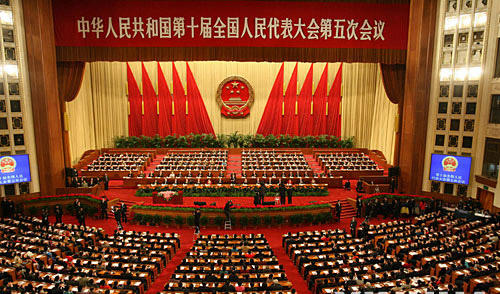
National People's Congress - China's Top Law Maker |
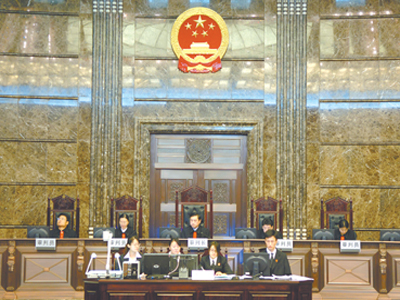
A civil case hearing
at China Supreme People's Court, Beijing |
|
|
|
China Law & Justice
Pictures |
|
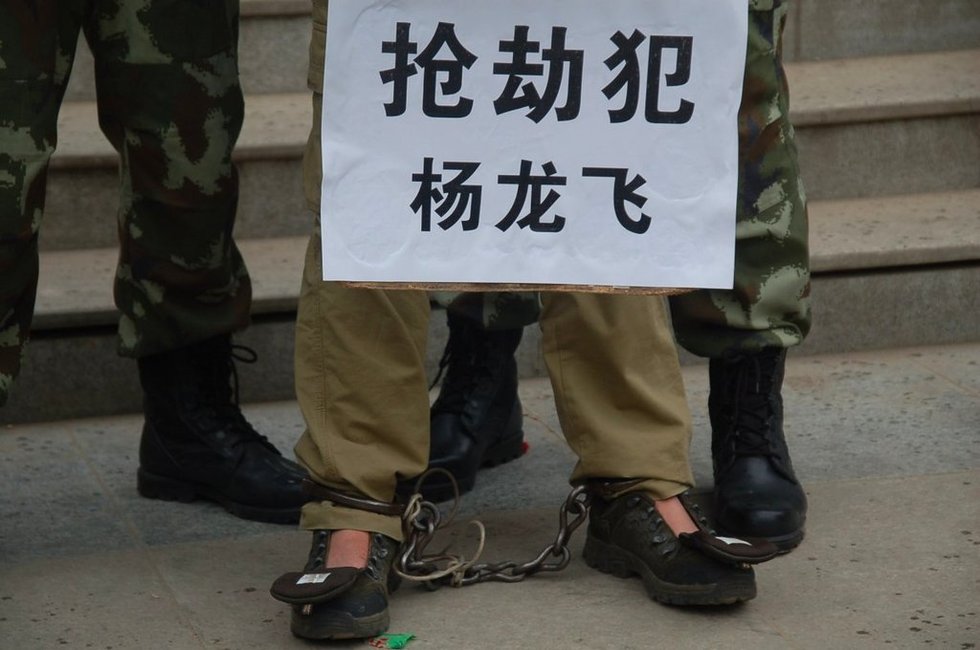
As a deterrent, two jewellery
shop robbers are shown to the public in Luonan County,
Shaanxi Province. |
|
|
|
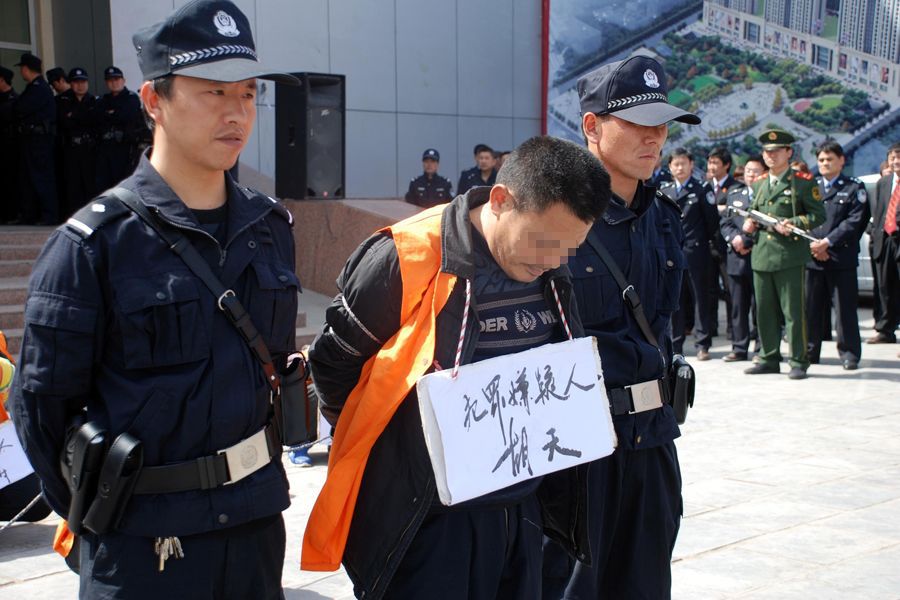
Pictures: Public humiliation of criminals in
Henan |
|
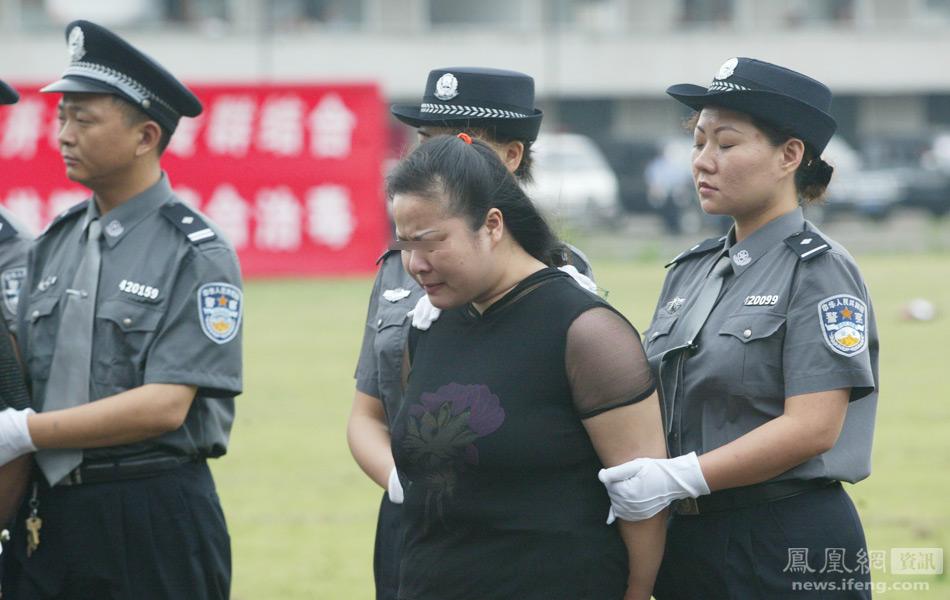
Pictures:
Female Drug Dealers Last 12 Hours Before Execution |
|
|
|
What
Official Sources Say
|
- Huang Guangyu:
From tycoon to prisoner (click
for details)
-
China amending law after detention
death row Oct. 27, 09
-
China's first anti-monopoly law takes effect Aug. 1, 2008
-
China
issues guidelines to limit death penalty use (Xinhua,
official source)
- China's supreme court hosts first open house for public:
China's Supreme People's Court (SPC) for the first time
hosted an open house to nearly 40 invited public visitors on
Friday, to mark the 9th National Day for the Publicity of
the Law. SPC spokesman Sun Jungong said the move was to let
the public better know about the SPC, further increase their
understanding of China's legal system, and raise their
awareness of safeguarding the rule of law. Sun said the SPC
would "regularize" such activities and offer chances for
more people to visit the court, get close to the judges and
give advices on the development of China's judicial system.
More than 1,700 local courts in China have conducted such
activities. (Dec. 4, 09, Xinhua)
-
China
orders jails to intensify security measures after
prison-breaking
(Xinhua)
-
China
draft law of social insurance draws nationwide debate -
Xinhua
-
China completes motion picture
law, banning porn, violence contents - Xinhua
-
New laws to help shape China's
Civil Code. China Daily
-
Lawsuit over
China tainted milk rejected
BEIJING (AP, Dec. 8, 2008) A court in China has refused to
accept a lawsuit against a Chinese dairy filed by dozens of
families whose children were sickened by tainted milk.
Lawyers involved in the case said Monday the lawsuit on
behalf of 63 defendants ? including the parents of two
children who died ? sought compensation from state-owned
Sanlu Group Co. Sanlu is the dairy at the center of China's
worst food safety crisis in years. "We will continue to push
the case" and put pressure on them, activist lawyer Li
Fangping said. China's Health Ministry admitted last week
that six babies likely died, twice the previous figure, and
294,000 babies suffered urinary problems from drinking
contaminated infant formula.
-
China's first anti-monopoly law takes effect Aug. 1, 2008
-
China
handles more trademark infringement cases.
Xinhua
- China
adopts law to protect state assets. China Daily -
China's top legislature on Tuesday adopted a law designed to
protect state-owned assets from being illegally seized. The
enterprise state-owned assets law, which goes in to effect
on May 1, 2009, was approved at a bimonthly session of the
Standing Committee of the National People's Congress (NPC)
after the third reading.China has nearly 120,000 state owned
enterprises. These included enterprises or companies with
sole state ownership and joint-venture companies with the
state as the biggest shareholders, according to State-owned
Assets Supervision and Administration Commission (ASAC)
statistics.
-
China, EU found first joint law school
- The CESL is an important step in China-EU cooperation and in
China's progress to rule of law, Li said. He called on
China and the European Union to operate the CESL as an important
platform to learn from each other and cultivate professionals
acquainted with both Chinese and EU law.
Barroso said
the CESL would help to increase mutual understanding and cement
the EU-China comprehensive strategic partnership.
Meeting with
Barroso before the ceremony, Li called for strengthening of
dialogue and cooperation between China and the EU.
The CESL is a
part of the China University of Political Science and Law.
Jointly operated by 16 Chinese and European universities, the
CESL aims to cultivate a new generation of comprehensively
trained law professionals proficient in international legal
procedure. (Oct. 24, 2008 Xinhua)
|
|
|
China Law
Education and Training
|
|
|
|
|
Picture Report
|
|

A foreign
prisoner (detained in a prison in Shanghai) using old newspapers
made a model of the Bird’s Nest (China National Stadium for 2008
Summer Olympics). The prisoner used old newspapers to curl into
more than 8,000 long sticks and 10,000 short sticks and made the
model, it took him 28 days to complete. |
|
|
Facts and
Figures |
-
Total number of lawyers in China 118,000 - about 0.8
per 10 thousand population (source: Ministry of
Justice 2007)
- Total
number of law firms: 11,000, 70% of them are
partnership firms.
- Total
number of judges: 190, 961 (2004)
- Total
number of laws and regulations: 1979-1983: 4119
issued; 1996-2000: 37775 issued
2001-2004: 94288, issued
- Total
number of verdicts made: 1,179,388 (1981); 5,625,310
(2004)
|
|
|
ADVERTISEMENT
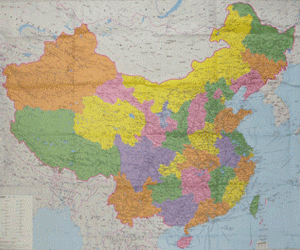 |
|
|
China Law Links:
Hong Kong Law
International Business
Others
|
|
|
China Laws and
Regulations Links:
|
All
the content and
linked content provided in this page is for your
informational purposes ONLY.
ChinaToday .com disclaims all liability or
responsibility for the ACCURACY and COMPLETENESS of the
content and linked content provided in this section. |
Laws Regarding General Business
Laws Regarding Foreign Investment in China
- Detailed Rules For The Implementation Of
The Law Of The People's Republic Of China On Sino-Foreign
Contractual Joint Ventures
- Rules for the Implementation of the Income
Tax Law of the People's Republic of China Concerning
Chinese-Foreign Joint Ventures
- The Income Tax Law of the People's
Republic of China Concerning Foreign Enterprises
- Interim Provisions of the State Council of
the People's Republic of China for the Control of
Resident Representative Offices of Foreign Enterprises
- The Law of the People's Republic of China
on Enterprises Operated Exclusively with Foreign Capital
- Notice of the General Administration for
Industry and Commerce of the People's Republic of China
Concerning the Handling of Registration Matters by
Resident Representative Offices of Foreign Enterprises
- Interim Regulations on Foreign Exchange
Control of the People's Republic of China
-
Provisions on the Establishment of
Foreign-Funded Construction Enterprises
Foreign Trade and Import & Export Laws
Laws Regarding Immigration and Entry /
Exit Administration
Others
|
|
|
News about
China Lawyers |
|
Number of
Lawyers Rapidly Rising in China
The number
of lawyers in China has jumped to the present 110,000
from a mere 200 two decades ago, a seminar has been
told. Addressing a seminar on international cooperation
in the modern tertiary industry, Jia Wuguang, general
secretary of the All-China Lawyers Association, said a
sharp rise in the number of lawyers shows the rapid
expansion of the country's legal services.
There are
now nearly 10,000 law offices in China, he said. They
include lawyers specializing in the securities, finance
and real estate sectors. There is a great market
potential for lawyers as the economy becomes
knowledge-based and emerging sectors become mainstream,
added the general secretary.
He
explained the knowledge-based economy and emerging
sectors will need more professional legal services than
the traditional economy did.
Moreover,
he described legal services as an important part of the
sound investment environment essential for overseas
investors.
China has
been steadily opening its legal services market to the
outside world since early 2001 and 104 foreign law firms
and 28 Hong Kong law offices have set up branches on the
Chinese mainland. (July 8, 2002) |
|
|
Law and Lawyer Related Links |
-
California Labor Law Firm - California labor law firm experienced in assisting employees with California overtime laws and wage and hour pay claims. We offer a free case evaluation.
-
California Overtime Law Firm - United Employees Law Group is a California law firm experienced in enforcing California overtime laws and overtime pay on behalf of CA employees. Our California overtime lawyers will provide a free case review!
-
Accident Compensation Claims - Advice from specialist personal injury solicitors on the no win no fee scheme. Accident compensation paid in full.
-
Contentious probate solicitor - Expert lawyers offer free advice on disputed wills and probate.
-
Cerebral Palsy Compensation Claim - Our referral service will provide you with specialist legal advice from Australian medical negligence solicitors. Find out what your rights are today.
-
Accident at Work Compensation Claims UK - Been in an accident at work? The Claimant Law personal injury lawyers are here to give you expert advice on making an 'Accident at Work' compensation claim in the UK.
-
IT Jobs - CV-Library.co.uk - 1000's of IT jobs from the UK's top recruiters and employers.
More Law
Links ...
|
|
|
Report: China Remains Top
Executioner
|
|
July 23,
2008, Press Association
Executions
jumped by a third in Iran and quadrupled in Saudi Arabia last
year, causing the total number of executions around the world to
rise yet again in 2007, a human rights group reported, adding
that China remained far in front as the world's top executioner.
The
Rome-based Hands Off Cain, which campaigns to stop the death
penalty, said that while countries were increasingly renouncing
the death penalty, more people were put to death in 2007 than in
either of the previous two years.
In all, the
number of executions increased last year to at least 5,851,
compared with 5,635 in 2006 and 5,494 in 2005, the group said in
its annual report.
The gradual
trend of abolishing capital punishment continued, with 49
countries retaining the death penalty, compared with 51 in 2006
and 54 in 2005. Only 26 countries that have capital punishment
on their books actually used it in 2007, down from 28 in 2006,
the report said.
China alone
accounted for at least 5,000 executions, the rights group
estimated, based on reports by the media and other human rights
groups. The exact number of executions in China remains a state
secret. This was the same estimate the group gave for China last
year.
However,
Hands Off Cain said there were indications of a reduction in the
number of death sentences in China.
Citing
reports by magistrates, researchers and rights groups, the group
said death sentences issued by Chinese courts may have dropped
by up to 30% in 2007. China's own Supreme People's Court has
said it rejected 15 percent of all death sentences reviewed in
the first half of this year.
In Iran, at
least 355 people were put to death last year, compared with 215
in 2006, the group said, adding that the figure may be even
higher because Tehran does not publish official statistics.
Saudi Arabia
carried out 166 executions, compared with 39 a year earlier, the
report said. Hands Off Cain said both Iran and Saudi Arabia
executed minors, in violation of the UN Convention on the Rights
of the Child. Pakistan also continued an upward trend, executing
at least 134 people.
The US
remained the only country in the Americas that carried out death
sentences in 2007 - putting 42 people to death, 11 less than in
2006 and the lowest number in 13 years.
|
|
|
China's first
anti-monopoly law takes effect
|
BEIJING, Aug. 1
2008
(Xinhua) -- China's first
anti-monopoly law took effect on Friday, viewed as a
milestone of the country's efforts in promoting a fair
competition market and cracking down on monopoly activities.
The law,
which was proposed 14 years ago and finally received
official approval last year from the Standing Committee of
the National People's Congress, the country's top
legislature, aimed to build a uniform, open, transparent
market, and to encourage fair competition, experts said.
Sheng
Jiemin, a Peking University law professor, told Xinhua it
had introduced some advanced concepts from America's
anti-monopoly law, which strikes at dominating enterprises'
monopolistic activities and puts safeguarding consumer
rights as priority.
"It is
different from other economic laws," Sheng explained.
"Punishment usually comes after a long and thorough
investigation and research under the anti-monopoly law."
The State
Council, China's Cabinet, said it had established an
Anti-monopoly Committee earlier this week. It will research
and map out relevant laws, investigate and monitor
enterprises and companies, assess the competition situation
in the market and cooperate with other government bodies to
enforce the law.
Despite
this significant improvement in the country's economic
reform and legal system, experts felt the government still
had a lot to do to perfect the law and enhance its
efficiency. "There is possibility for crossing and overlay
of the functions between the three law enforcement bodies,"
Sheng said. "It is hoped that an unified institution comes
out in the coming years, which will be better in accordance
with the country's situation."
"The
country currently has no better measures to solve the
monopoly problem in some crucial centrally-administrated and
state-owned large enterprise and industrials," said Zhang
Yansheng, the NDRC's International Economic Research
Institute director.
Any
activities that harm consumer rights were discouraged, Zhang
added.
Three
government organs, including the National Development and
Reform Commission (NDRC), the Ministry of Commerce, and the
State Administration for Industry and Commerce (SAIC), will
enforce the law and carry out its implementation in a
coordinated fashion.
The SAIC
said earlier it had established an independent bureau, which
was in charge of investigating and punishing unfair
competition, commercial bribery, smuggling and other cases
that broke relevant economic laws.
In
addition, the country's top economic regulator, the NDRC,
finished a draft of the anti-price monopoly law regulation
earlier this week, which was a component of the
anti-monopoly law.
According
to the draft, monopolizing enterprises that intended to
control prices, dump their products at extremely low prices
and sold products at various prices between different
consumers at random, would face punishment.
"The
anti-price monopoly law regulation will determine the
government's actions in cracking down on price monopoly via
a legal basis," said Li Lei of the NDRC's price supervision
department.
The
anti-monopoly law was not expected to shake the country's
"4S" automobile marketing mode, which features a combination
of "sales, spare parts, service, and survey," market
analysts said.
"Since
no single automobile enterprise dominates the domestic
market, there is no monopoly in this sector," said a
Ministry of Commerce official who declined to be named. "The
only problem is excessive competition."
|
|
|
